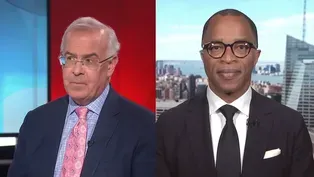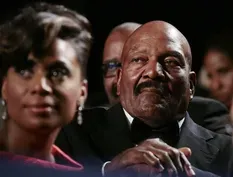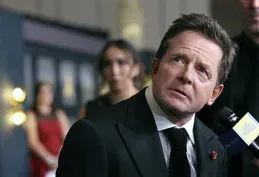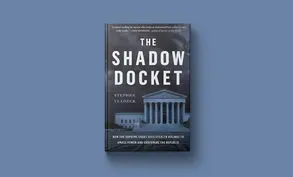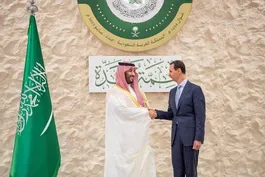
U.S. will help train Ukrainian pilots on F-16 fighter jets
Clip: 5/19/2023 | 5m 52sVideo has Closed Captions
What the plan to provide F-16 fighter jets to Ukraine means for the war against Russia
The Biden administration will approve European allies providing American made F-16 fighter jets to Ukraine. The U.S. will also support a joint effort to train Ukrainian pilots. Ukraine has been asking for those jets since early in the war with Russia, but until now, the U.S. has refused. Amna Nawaz discussed the policy reversal and what it means for the war with Retired Lt. Gen. Doug Lute.
Problems with Closed Captions? Closed Captioning Feedback
Problems with Closed Captions? Closed Captioning Feedback
Major corporate funding for the PBS News Hour is provided by BDO, BNSF, Consumer Cellular, American Cruise Lines, and Raymond James. Funding for the PBS NewsHour Weekend is provided by...

U.S. will help train Ukrainian pilots on F-16 fighter jets
Clip: 5/19/2023 | 5m 52sVideo has Closed Captions
The Biden administration will approve European allies providing American made F-16 fighter jets to Ukraine. The U.S. will also support a joint effort to train Ukrainian pilots. Ukraine has been asking for those jets since early in the war with Russia, but until now, the U.S. has refused. Amna Nawaz discussed the policy reversal and what it means for the war with Retired Lt. Gen. Doug Lute.
Problems with Closed Captions? Closed Captioning Feedback
How to Watch PBS News Hour
PBS News Hour is available to stream on pbs.org and the free PBS App, available on iPhone, Apple TV, Android TV, Android smartphones, Amazon Fire TV, Amazon Fire Tablet, Roku, Samsung Smart TV, and Vizio.
Providing Support for PBS.org
Learn Moreabout PBS online sponsorshipAMNA NAWAZ: White House officials say the Biden administration will approve European allies providing American-made F-16 fighter jets to Ukraine.
The U.S. will also support a joint effort to train Ukrainian pilots to operate them.
Ukraine has been asking for those F-16s since early in the war with Russia.
Up until now, the U.S. has refused.
For more on this policy reversal and what these jets mean for the war, we turn to retired Lieutenant General Doug Lute.
He had a 35-year career in the Army and served on the National Security Council for both George W. Bush and Barack Obama.
He was also the U.S. ambassador to NATO during the Obama administration.
General Lute, as you know, the U.S. had previously said providing those F-16s could be provocative.
They also said the Ukraine didn't necessarily need that specific military capability.
So what changed?
LT. GEN. DOUGLAS LUTE (RET.
), Former U.S.
Ambassador to NATO: Well, look, you're right that this has long been on the list of requirements from the Ukrainian government to the 50-nation coalition that has been providing military support.
But you're also right that we have not to date agreed to this requirement up, in part because we're concerned about provoking Russia.
But the longer pattern here over the last 15 months of this war is that, time and again, Russia has told us, don't do something, it will be provocative, and we will respond.
We eventually do it, whether it's long-range rocket systems, tanks, Patriot air defense systems, and now F-16s, only to see that Russia does not have the capability to actually do much about it.
AMNA NAWAZ: Do you think the U.S. or the allies should have provided these F-16s earlier?
Would it have made a difference in the war?
LT. GEN. DOUGLAS LUTE: Well, I think, certainly, given the hindsight of the last 15 months, these would have been much -- very much useful over the last year or so.
And, frankly, the Ukrainians have been suffering from an imbalance in manned aircraft, where the Russians have a distinct advantage.
So this decision now to provide aircraft and provide the training required really addresses that imbalance.
And I think it's one of the last remaining imbalances, frankly, in the favor of the Russians.
AMNA NAWAZ: So what does this allow the Ukrainians to do specifically in the war that they couldn't do before?
LT. GEN. DOUGLAS LUTE: Well, the F-16 provides two key capabilities.
First of all, on the offensive side, it can provide precision close air support to ground troops, and that will be very important as the Ukrainians take the offensive this year and into next year.
The second thing it can do on the offensive side is provide deep fires.
This is fires well into the depth beyond the front lines into occupied Ukraine, where Ukraine can increasingly hit Russian command-and-control sites, Russian headquarters, Russian logistics sites in bases deep into -- deep into occupied Ukraine, for example, even into Crimea and into the waters of the Black Sea.
On the defensive side, these aircraft are also important, because they can take on the Russian manned aircraft, but also, very important, they can attack the Russian cruise missiles which have been striking Ukrainian civilian infrastructure.
So, both on the offensive side and the defensive side, the F-16 could really make a difference.
AMNA NAWAZ: What about training Ukrainian pilots to use them?
There was a report this week, based on some U.S. Air Force internal documents, that said the U.S. could probably train Ukrainian pilots to fly those F-16s in as little as four months.
Do you see that happening?
LT. GEN. DOUGLAS LUTE: Well, I will leave it to the experts who actually fly F-16s to make that declaration.
But four to six months seems reasonable to me.
And we have been increasingly, over time, surprised time and again by the ability of the Ukrainians to adopt new systems which are technically very sophisticated, difficult to maintain.
But they have proved adept at accepting these new systems from the Western coalition and making good use of them on the battlefield.
So my bet here is on the Ukrainians.
AMNA NAWAZ: So if these jets could potentially allow Ukraine to claim back some of that territory by Russia, Donbass and Crimea, in particular, does that translate to ending the war on terms more acceptable to Ukraine?
LT. GEN. DOUGLAS LUTE: Well, it moves us in that direction.
But, to be clear, Amna, this is not going to happen this year, when you add the four to six months of training with the delivery process of the aircraft themselves.
And remember, it's not just the aircraft.
You have to deliver a maintenance capability to keep the aircraft flying.
That really means that it is unlikely that this decision today is going to make a meaningful difference on the battlefield this year.
AMNA NAWAZ: General Lute, we know we have been anticipating a spring Ukrainian counteroffensive for a while.
What can you tell us about that?
And why haven't we seen that launched yet?
LT. GEN. DOUGLAS LUTE: Well, we, as Americans, tend to be impatient on these things.
We want to see it in the next news cycle or something, right?
But, look, the Ukrainian commanders are amassing forces.
They're marshaling their resources.
They have amassed, created nine new maneuver brigades.
Think of a brigade as 4,000 to 5,000 new troops, armed with new equipment, trained together, ready to go on the offensive.
And now, because they have the initiative, the Ukrainian commanders can pick the timing and the location and the method of attack, all to their advantage.
And they're waiting for that moment.
Again, my confidence is in the Ukrainians, who have proved time and again that they understand this battlefield.
It is after all, Ukraine.
This is a home court advantage for the Ukrainians.
And they will pick the time and place that's right and most advantageous for the offensive.
AMNA NAWAZ: That is retired Lieutenant General Doug Lute joining us tonight.
General Lute, always good to speak with you.
Thank you.
Brooks and Capehart on the debt ceiling negotiations
Video has Closed Captions
Clip: 5/19/2023 | 11m 1s | Brooks and Capehart on debt ceiling negotiations and Republicans joining the 2024 race (11m 1s)
Jim Brown's life and legacy as a football great and activist
Video has Closed Captions
Clip: 5/19/2023 | 7m 18s | A look at Jim Brown's life and legacy as a football great and activist (7m 18s)
Michael J. Fox tells his own story in new documentary
Video has Closed Captions
Clip: 5/19/2023 | 8m 26s | Michael J. Fox tells story of his career and living with Parkinson's in new documentary (8m 26s)
'Shadow Docket' explores Supreme Court's growing influence
Video has Closed Captions
Clip: 5/19/2023 | 6m 38s | New book 'Shadow Docket' explores Supreme Court's growing influence on American law (6m 38s)
Syria welcomed back into Arab League after years of war
Video has Closed Captions
Clip: 5/19/2023 | 7m 27s | Syria and Assad regime welcomed back into Arab League after years of civil war (7m 27s)
Providing Support for PBS.org
Learn Moreabout PBS online sponsorshipSupport for PBS provided by:
Major corporate funding for the PBS News Hour is provided by BDO, BNSF, Consumer Cellular, American Cruise Lines, and Raymond James. Funding for the PBS NewsHour Weekend is provided by...
